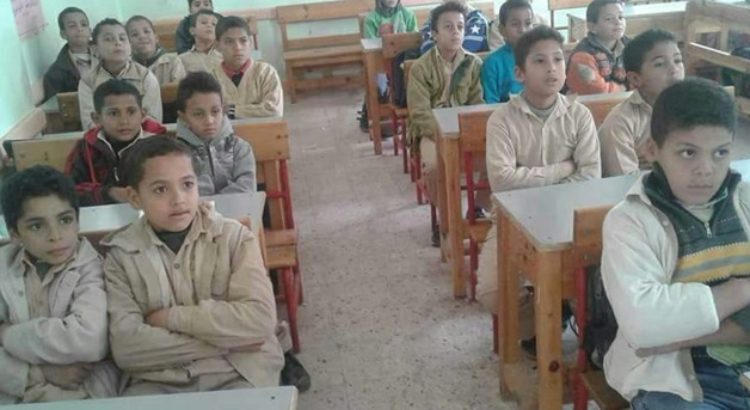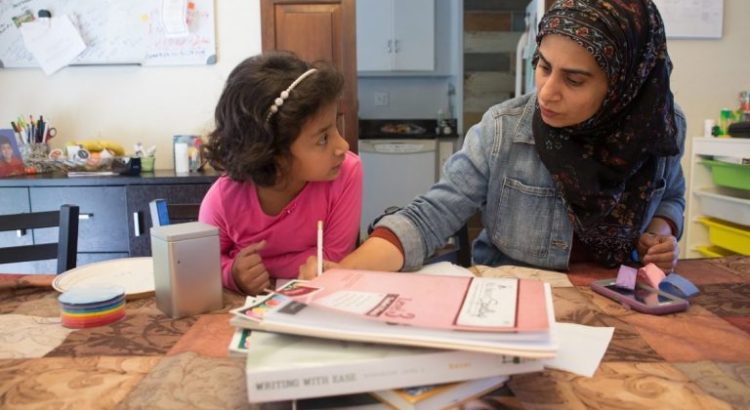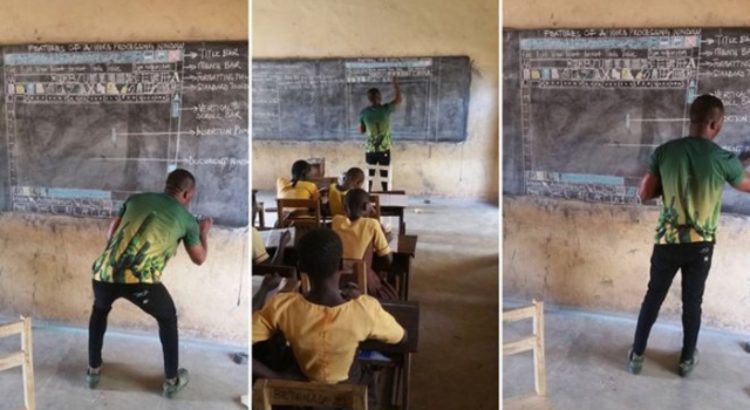By Peter Partey Anti
Last Sunday was the maiden show of a news program on GhOne TV hosted by Nana Aba Anamoah. Normally our media houses do not have very rich current affairs programs for their viewers on Sundays, so this program caught my attention right from the start.
The truth, however, is that, during the headlines, I heard the term “belly schooling”, a term I was hearing for the first time in education literature, so I decided to listen to what the story was about. That story broke my heart. Pupils in a school in Yikurugu in the Northen part of Ghana lie on their stomach to study. This is happening in an educational institution in Ghana in the year 2018.
Again, recently a picture of a teacher trying to teach ICT, specifically, the interface of Microsoft word went viral on social media. That picture has been featured in international media reports like the CNN, BBC among others. While some were happy for the school and the teacher, others like myself felt bad for what our educational system has turned out to be. And yes, this is Ghana in 2018.
A country that prides itself as the first country sub of the Sahara to gain independence. A country that has spent between 22% – 27% of its annual budget on education over the last decade; a country that is 61 years today. Growth theorists are vocal about the role of human capital and technology in a country’s long-term growth potential and not just any human capital, but an educated one. It is therefore not surprising that, 61 years ago today, there was a huge focus on education by the leaders at that time.
The address of the President, Osagyefo Kwame Nkrumah to the legislative assembly a day before independence had education as its pivot; the driving force of the country’s development agenda. He envisioned an educational system that is designed to address the challenges we faced as a country. A critical read of McWilliam and Kwamena-Poh reveal that the focus of the then President was to use education to answer the questions of technology, productivity and the economic potential of the country.
This explains the level of investment made by him in the education sector. It is therefore not surprising that between 1951 and 1966, primary schools increased by 647.8%, secondary schools increased by 707.7% whiles one university was added to the already existing two universities. This coupled with other levels of education such as teacher training colleges, technical and middle levels all saw a tremendous improvement. To most experts, education was geared towards solving the Ghanaian problem. Since then there have been changes in our educational agenda, prominent among them are the 1987 and 2007 educational reforms.
These two reforms in particular even though properly conceived were implemented in a way that made it impossible for us to realize its full benefits. The introduction of the JSS and SSS to replace the old system of O’Level and A’Level have been one of the defects of the 1987 Educational Reform according to some educationists. In fact, some have attributed the challenges in our educational system presently in terms of its structure and content to this reform. To others, the two systems should have been allowed to run concurrently.
As someone who is a product of the 1987 educational reform, I will not be quick to pass a judgement on it but to say that, a critical study of the reform brings to fore the good intentions of the policymakers but the problem of resources and lack of commitment to the implementation process led to the non-realization of objectives of that reform.
About five years ago, I had the opportunity to do a comprehensive review of the 2007 educational reform for an international organization. My observation was simple, we ignored the important elements in that reform and focused on the change of name and duration.
That reform was rich in its plans for Technical, Vocational and Agricultural Education agenda and the attempt to incorporate apprenticeship into our educational system. Sadly, we focused on the duration of either 3 or 4 years and the change of name from JSS and SSS to JHS and SHS respectively. The usual problem of fidelity in the implementation of the reform made sure that the objectives of the reform were not met entirely.
From the last 25 years, we have been able to increase access to education for a number of children in the basic level courtesy the introduction Free Compulsory Universal Basic Education (FCUBE) in 1996 and the Capitation Grant in the 2004/2005 academic year. We are seeking to increase access to students at the secondary school level with the introduction of the free SHS.
Sixty-one years after the take off in the educational sector, supported with the fact that, other countries with a robust educational sector have been able to transform their economy, it would have been ideal to see a transformed Ghana championed by an education system designed to address the challenges of our time.
Sadly, we are currently faced with graduate unemployment. What it means is that we are investing in education and yet the products of our educational system cannot be absorbed by the economy. The reasons for these are enormous but if in 1957, the focus was to use education to solve the problems of technology, productivity and how to harness the economic potential of the country, why have we not made progress?
The answer lies in the nature of our curriculum. As indicated earlier on, increasing access to education, investing in education and undertaking various reforms in the education sector should be geared towards addressing the challenges of the time and not be seen as a normal routine.
I am not oblivious to the fact that, currently there is a process ongoing to reform the curriculum for the pre-tertiary level and also teacher education in Ghana. How many of you are aware of this? I can only hope and believe that all the relevant stakeholders are involved in this process.
Aside from this, there is an increasing level of inequality between the urban student and his/her counterpart in the rural area. We continue to roll-out wholesale educational policies without paying attention to the disparities that exist in our society. A visit to most of the schools in rural Ghana will give you an indication of what we need to do as a country in terms of policy formulation in the education sector. How can we introduce ICT into the school curriculum and yet a majority of our schools in the rural areas lack just a computer?
How can we roll-out a policy called “One laptop per child” and yet most of those laptops were given to party members and sympathizers. What is the state of that policy now? Where are the laptops? Why should a child lie on his stomach to enjoy an instructional session when our leaders ride in expensive cars and jump from one radio station to another to lamenting about the problems that they have been elected and are being paid to solve.
This should not be misconstrued to mean we have not done anything as country in terms of education. We have improved access, we have expanded infrastructure and have increased our spending in the education sector. But the end product has been an increase in the level of youth unemployment, sanitation problems, increase in corruption, and an upsurge in crime, a total decline in the moral fabric of our society and reduction in patriotism.
According to Prof Agyemang, a renowned sociologist, education is a process by which each society influences its individuals by passing onto them the culture which is the totality of the society’s accumulated knowledge, art, laws, morals and ways of behaviour, the acquisition of which brings the individuals to the perfection of their nature. A good educational system should yield more positive fruits than negative but can we say this about our educational system, 61 years on?
So yes, this is Ghana’s education after 61 years, when you log on to social media and you come across videos and comments seeking to question the importance of learning osmosis, diffusion, quadratic equations among others, do not be dismayed, that is the system we have created. We have failed to establish relevance or what in Quality Teaching Model, we call, Significance. We love students who can reproduce verbatim what we presented to them during the instructional session.
We have paid lots of attention to examination than to learning. Our educational policies have sought to put students in school but not help students to learn. I once came across this distorted quote on social media “Education is key, but they have changed the lock”. This seems funny but it tells us the perception of people about our educational system after 61 years of independence.
We have to get it right, we will get it right, left us not be populace in our educational policies, let us avoid the wholesale educational policies and let us make sure that, each child in the country receives quality education irrespective of where he/she is. Education remains the key to lifting us from poverty to prosperity, let us get it right.
Source of the article: https://www.myjoyonline.com/opinion/2018/March-9th/61-years-of-education-in-ghana.php













 Users Today : 30
Users Today : 30 Total Users : 35459625
Total Users : 35459625 Views Today : 72
Views Today : 72 Total views : 3418044
Total views : 3418044